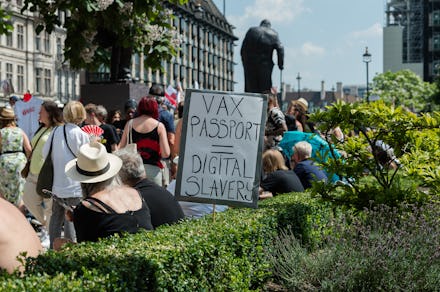Should governments make life harder for the unvaccinated?

Coronavirus cases are once again on the rise across the country, due in part to the Delta variant. The Centers for Disease Control and Prevention reported that 35% of counties in the U.S. were seeing high levels of community transmission as of last week. But unlike at the start of the pandemic, there is now a vaccine for the coronavirus. As cases rise and vaccine demand wanes, a divided strategy has emerged for getting shots in arms: mandate vaccination or make life miserable for the unvaccinated.
Only about 50% of eligible people in the U.S. are fully vaccinated. While that's certainly better than nothing, to reach herd immunity, about 70 to 85% of the population needs to be vaccinated. On Monday, a group of over fifty health care groups, including the American Academy of Pediatrics and the American Medical Association, released a joint statement to mandate coronavirus vaccines for workers in healthcare and long-term care facilities.
In an op-ed for USA Today, Ezekiel J. Emanuel, co-director of the Healthcare Transformation Institute at the University of Pennsylvania, who helped organize the statement, wrote that a federal vaccine mandate is unlikely to be announced by the Biden administration anytime soon, since the government's authority to issue a vaccine mandate is unclear.
This much is unsurprising given all the fuss over mask mandates last year. Last summer, Joe Biden promised a mask mandate when accepting the Democratic nomination for president. However, Lawrence Gostin, a professor at Georgetown University of Law Center, previously told Mic that "public health powers are vested in the states. States could enact a statewide mask mandate, but not the president."
Given that plenty of states rejected mask mandates, it's easy to assume all fifty wouldn't mandate vaccines. Plus, as Emmanuel, Guido, and Diana point out, the politicization of everything related to the pandemic means that Democrats aren't going to "risk political backlash and conservative claims of government overreach." But that doesn't mean all is lost. "The private sector needs to fill the void," says the researchers. "Private employers are in a better position to institute mandates and have precedent to do so."
Conversations about vaccine mandates have been in the news for months, but as the cases surge in the U.S., it's becoming more of a necessary discussion to have. So far, many colleges require the coronavirus vaccine before resuming classes in the fall.
But vaccination remains low among healthcare workers. The Washington Post reported that more than 38% of nursing workers weren't fully vaccinated as of mid-July, even though they care for patients at increased risk for the coronavirus.
Requiring vaccines would lead to inevitable pushback and protest. When Houston Methodist first issued its vaccine mandate earlier this year, over 150 people were fired or resigned — but the hospital eventually reached a 99% vaccination rate. In June, IntegraCare, which runs thirteen senior homes in Maryland, Virginia, and Pennsylvania, achieved a 100% vaccination rate among staff following its mandate.
Cities are also experimenting with blanket mandates. San Francisco requires that all of its municipal employees receive vaccinations. New York City mayor Bill de Blasio announced on Monday that workers in public hospitals in the city will need to get vaccinated by September or endure weekly coronavirus testing.
Instead of public mandates, European countries are making life less pleasant for the unvaccinated. Over the weekend, Helge Braun, chief of staff to Germany's Chancellor Angela Merkel, said that the country may begin implementing restrictions on unvaccinated people. "This could mean...restaurant, cinema, and stadium visits would not be possible for tested unvaccinated people because the residual risk is too high."
France has already adopted restrictions for unvaccinated people, passing a law that requires a coronavirus health pass for people to travel domestically or dine at restaurants. About 160,000 people protested in response to the law, while more than 1 million signed up to receive the vaccine. Similar protests took place in Italy in response to the government's "Green Pass" needed to access indoor dining, local fairs, stadiums, cinemas, and other gathering places — even as half a million people signed up for vaccines.
While the U.S. hasn't implemented health passes like France or Italy, some cities are using the threat of reinstated mask requirements as leverage. When making his announcement about NYC healthcare workers, Bill De Blasio also said that any indoor city workers must return to wearing masks, unless they've got the vaccine.
However, both vaccine mandates and restrictions for the unvaccinated won't overcome the systemic barriers that make receiving vaccines difficult; non-English speakers often encounter language barriers, and many workers can't take time off work for the shot or weather through its possible side effects. In addition, given the U.S.'s history of policing, mandates or restrictions may open up communities of color to increased policing; in cities like New York, police took markedly different strategies in enforcing social distancing guidelines.
Still, it's clear that as summer ends and cases continue to rise, more needs to be done to increase vaccination rates.